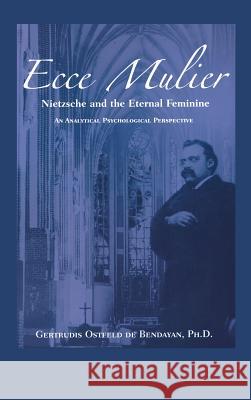Ecce Mulier: Nietzsche and the Eternal Feminine, an Analytical Psychological Perspective » książka
Ecce Mulier: Nietzsche and the Eternal Feminine, an Analytical Psychological Perspective
ISBN-13: 9781630510565 / Angielski / Twarda / 2013 / 330 str.
Creativity and madness, sparked by the intrusion of unconscious symbolism, arise from the same feminine depths--what Jung, following Goethe, called the realm of the Mothers. Which one triumphs depends on the strength of the ego under the onslaught of unconscious contents. The developmental course of that ego, and its archetypal aspects, are charted here, in a psychobiography that ventures into the realm of the Mothers so that the creativity and the madness of Friedrich Nietzsche can be better understood.Drawing upon classical, archetypalist, and developmental approaches, Dr. Ostfeld de BendayAn investigates the purpose and meaning of Nietzsche's states of mind, his emotional life, his dominant patterns of behavior, his recurrent fantasy motifs, his interests and choices, his symptoms, and his manifestations of the Self. Dreams, visual and auditory hallucinations, and poems are mined for insights, and alchemy, religion, philosophy, literature, and archetypal symbolism provide further illumination. The result is a rich analytical psychological portrait that enhances our understanding of psychic dynamics in general, of the etiology of psychosis, of the fruitful alliance between psychology and myth, of the existential condition of postmodern (Dionysian) humanity, and of the relationships between the creative process and the collective unconscious.
Creativity and madness, sparked by the intrusion of unconscious symbolism, arise from the same feminine depths—what Jung, following Goethe, called the realm of the Mothers. Which one triumphs depends on the strength of the ego under the onslaught of unconscious contents. The developmental course of that ego, and its archetypal aspects, are charted here, in a psychobiography that ventures into the realm of the Mothers so that the creativity and the madness of Friedrich Nietzsche can be better understood.Drawing upon classical, archetypalist, and developmental approaches, Dr. Ostfeld de Bendayán investigates the purpose and meaning of Nietzsche’s states of mind, his emotional life, his dominant patterns of behavior, his recurrent fantasy motifs, his interests and choices, his symptoms, and his manifestations of the Self. Dreams, visual and auditory hallucinations, and poems are mined for insights, and alchemy, religion, philosophy, literature, and archetypal symbolism provide further illumination. The result is a rich analytical psychological portrait that enhances our understanding of psychic dynamics in general, of the etiology of psychosis, of the fruitful alliance between psychology and myth, of the existential condition of postmodern (Dionysian) humanity, and of the relationships between the creative process and the collective unconscious.











